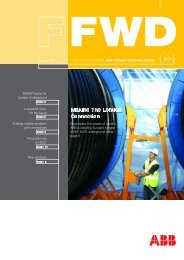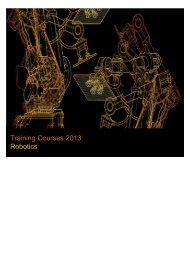Oil and gas production handbook An introduction to oil ... - ABB Group
Oil and gas production handbook An introduction to oil ... - ABB Group
Oil and gas production handbook An introduction to oil ... - ABB Group
Create successful ePaper yourself
Turn your PDF publications into a flip-book with our unique Google optimized e-Paper software.
arrels per day in Oc<strong>to</strong>ber, 1861, <strong>and</strong> the Woodford well on the left came in<br />
at 1,500 barrels per day in July, 1862.<br />
The <strong>oil</strong> was collected in the wooden tank pictured in the foreground. As you<br />
will no doubt notice, there are many different-sized barrels in the<br />
background. At this time, barrel size had not been st<strong>and</strong>ardized, which made<br />
statements like "<strong>oil</strong> is selling at $5 per barrel" very confusing (<strong>to</strong>day a barrel<br />
is 159 liters (see units on p. 141). But even in those days, over<strong>production</strong><br />
was something <strong>to</strong> be avoided. When the "Empire well" was completed in<br />
September 1861, it produced 3,000 barrels per day, flooding the market, <strong>and</strong><br />
the price of <strong>oil</strong> plummeted <strong>to</strong> 10 cents a barrel. In some ways, we see the<br />
same effect <strong>to</strong>day. When new shale <strong>gas</strong> fields in the US are constrained by<br />
the capacity of the existing <strong>oil</strong> <strong>and</strong> <strong>gas</strong> pipeline network, it results in<br />
bottlenecks <strong>and</strong> low prices at the <strong>production</strong> site.<br />
Soon, <strong>oil</strong> had replaced most other fuels for mo<strong>to</strong>rized transport. The<br />
au<strong>to</strong>mobile industry developed at the end of the 19 th century, <strong>and</strong> quickly<br />
adopted <strong>oil</strong> as fuel. Gasoline engines were essential for designing successful<br />
aircraft. Ships driven by <strong>oil</strong> could move up <strong>to</strong> twice as fast as their coalpowered<br />
counterparts, a vital military advantage. Gas was burned off or left<br />
in the ground.<br />
Despite attempts at <strong>gas</strong> transportation as far back as 1821, it was not until<br />
after World War II that welding techniques, pipe rolling, <strong>and</strong> metallurgical<br />
advances allowed for the construction of reliable long distance pipelines,<br />
creating a natural <strong>gas</strong> industry boom. At the same time, the petrochemical<br />
industry with its new plastic materials quickly increased <strong>production</strong>. Even<br />
now, <strong>gas</strong> <strong>production</strong> is gaining market share as liquefied natural <strong>gas</strong> (LNG)<br />
provides an economical way of transporting <strong>gas</strong> from even the remotest<br />
sites.<br />
With the appearance of au<strong>to</strong>mobiles <strong>and</strong> more advanced consumers, it was<br />
necessary <strong>to</strong> improve <strong>and</strong> st<strong>and</strong>ardize the marketable products. Refining<br />
was necessary <strong>to</strong> divide the crude in fractions that could be blended <strong>to</strong><br />
precise specifications. As value shifted from refining <strong>to</strong> upstream <strong>production</strong>,<br />
it became even more essential for refineries <strong>to</strong> increase high-value fuel yield<br />
from a variety of crudes. From 10-40% <strong>gas</strong>oline for crude a century ago, a<br />
modern refinery can get up <strong>to</strong> 70% <strong>gas</strong>oline from the same quality crude<br />
through a variety of advanced reforming <strong>and</strong> cracking processes.<br />
Chemicals derived from petroleum or natural <strong>gas</strong> – petrochemicals – are an<br />
essential part of the chemical industry <strong>to</strong>day. Petrochemistry is a fairly young<br />
2

















